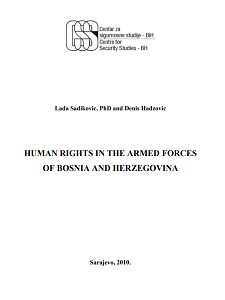Human Rights In The Armed Forces Of Bosnia And Herzegovina
Human Rights In The Armed Forces Of Bosnia And Herzegovina
Author(s): Lada Sadiković, Denis Hadžović
Contributor(s): Džermana Šeta (Translator)
Subject(s): Human Rights and Humanitarian Law, Military history, Security and defense, Military policy, Transformation Period (1990 - 2010)
Published by: Centar za Sigurnosne Studije
Keywords: BiH; military; armed forces; human rights; 2010;
Summary/Abstract: By ratifying the Convention for the Protection of Human Rights on July 12th 2002 BosniaHerzegovina has assumed responsibility that it will ensure the exercise of all human rights and fundamental freedoms regulated by the Convention and its protocols, for all individuals under its jurisdiction. This responsibility clearly implicates the protection of human rights for all individuals under its jurisdiction, regardless of the walks of life or organizational forms they belong to. It means that apart from human rights related to all individuals in BiH society, there are some areas which inherently do not allow for general realization and protection of human rights. Human rights pertaining to the members of armed forces fall within this category. On one hand, members of armed forces enjoy all rights and fundamental freedoms as granted by the European Convention, while, on the other hand, by the nature and requirements of their profession they inevitably experience numerous restrictions in terms of exercise of such human rights. It is only logical to assume that within the Armed Forces of Bosnia and Herzegovina, it will not be possible to exercise fully all human rights which are typically granted to those involved with the civilian sector, because of high level of subordination and centralization of such function. The delicacy of our task stems from the need to reconcile and harmonize human rights granted to all individuals with the obligatory restrictions immanent to the armed service. In accordance with the existing practice in modern European countries, the need arose to ensure the exercise of human rights for the individuals within that walk of life, at least inasmuch as it is feasible in such conditions, and, at the same time, without impeding normal functioning of the armed forces in terms of its defensive role. With this premise in mind, the objective of our research in Bosnia and Herzegovina is to examine the relationship between freedom of an individual member of the Armed Forces of Bosnia and Herzegovina and the need to successfully perform primary duties of the Armed Forces of Bosnia and Herzegovina. This task is especially delicate since, this is the first time that in Bosnia and Herzegovina, the concept of professional armed forces was introduced instead of former compulsory military service. This will give us the opportunity to use experience of developed democratic European countries which achieved certain results in this field and conducted research into relationship between armed forces and human rights of individual members of armed forces. It means that the project will mostly tackle the human rights fields which were subject to research in European countries, in order to pinpoint specific and characteristic aspects of our situation. Its most striking feature in this field is the fact that the armed forces are not mentioned specifically in the Constitution of Bosnia and Herzegovina (Annex 4 to the General Framework Agreement for Peace in Bosnia and Herzegovina), but in Annex 2 of the said Agreement. It is clear that future amendments to the Constitution will also regulate the constitutional status of the armed forces. Nevertheless, this research will be focused on the current state of affairs, regardless of the fact that the Dayton Agreement stipulated separate implementations for military and so-called civilian aspects of the Agreement, and that High Representative of the International Community is in charge of this field in accordance with Annex 10 of the Dayton Peace Agreement.
- Print-ISBN-13: 978-9958-9551-8-1
- Page Count: 46
- Publication Year: 2010
- Language: English
- eBook-PDF
- Table of Content
- Introduction

